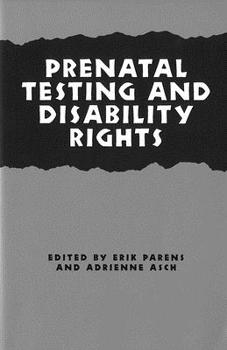Prenatal Testing and Disability Rights
(Part of the Hastings Center Studies in Ethics Series)
Select Format
Select Condition 
Book Overview
As prenatal tests proliferate, the medical and broader communities perceive that such testing is a logical extension of good prenatal care-it helps parents have healthy babies. But prenatal tests have been criticized by the disability rights community, which contends that advances in science should be directed at improving their lives, not preventing them. Used primarily to decide to abort a fetus that would have been born with mental or physical...
Format:Paperback
Language:English
ISBN:0878408045
ISBN13:9780878408047
Release Date:September 2000
Publisher:Georgetown University Press
Length:392 Pages
Weight:1.45 lbs.
Dimensions:0.9" x 6.0" x 8.9"
Grade Range:Postsecondary and higher
Customer Reviews
2 ratings
Airing the disability rights perspective
Published by Thriftbooks.com User , 23 years ago
(A longer version of this review ran in the January 2001 issue of Ragged Edge magazine.) Does prenatal testing for genetic defects "send a message" to disabled people? Adrienne Asch, the Henry L. Luce Professor of Biology, Ethics and Reproduction at Wellesley College, insists that it does. For two years, Asch and Hastings Center bioethicist Eric Parens engaged a group of scholars, philosophers, ethicists, biologists, physicians, sociologists and educators under the auspices of the Hastings Center to grapple with that question, and the disability rights perspective on prenatal testing in general. This book is the product of that project. After listening to all the opinions expressed by project members, Asch writes in an essay late in the book that she has not changed her mind. She says that people who choose to abort based on a diagnosis of disability are "allowing a single trait to stand in for the whole, to obliterate the whole." People like Baily -- and they are in the large majority in society -- simply do not believe that aborting a fetus because it will likely have a disability "sends a message" that is bigoted; most do not believe that it sends any message at all. Many do not agree that the provision of more accurate information about disabilities or about living with particular disabilities would make any great difference in their decision to abort a fetus they feared carried a "defect." Even knowing about disabled people and their lives, she would still not want to bear a disabled child if it could be avoided, says Baily. Nor do they buy the "any/particular" distinction articulated by Asch, who has been writing about the disability perspective on reproductive choice for decades. The "any/particular distinction" refers to the difference between the decision to simply not have any child at all at the time -- the decision of someone who becomes pregnant when they were not planning a family and thus seeks an abortion, for example -- and the decision to abort a particular fetus, even when the woman in fact wants a child, when prenatal testing has revealed disability in the fetus. The project, funded in part by a grant from the National Institute on Disability and Rehabilitation Research, did not reach unanimity on any of the "major claims" of the disability rights movement -- not after five intense two-day intense meetings, not despite ongoing email correspondence among participants, notwithstanding meetings with members of the Society for Disability Studies. So are we simply at that juncture in history in which almost no one outside one's tiny community of thought believes one's critique; before one's ideas are accepted? Is this what it was like in the 1800s to hear perfectly nice, logical people say things which we now we see as hopelessly racist? It's hard to tell. This is an important, though academic, book. It lays out both the disability rights critique from Asch, Marsha Saxton and others, and the reasons why people just don't "buy"
A Must Read for those Interested in Disability Rights
Published by Thriftbooks.com User , 24 years ago
This fascinating and thought-provoking book should be read by anyone interested in disability rights. It presents a variety of views on a challenging topic. The book deals with philosophical issues in understandable terms, and argues for a new paradigm for consideration of prenatal testing. Different chapters are written by various authors from different backgrounds. Physicians, professors, parents, those with disabilities, therapists and lawyers all contribute to this multifaceted approach to whether or not prenatal testing devalues those with disabilities. Social factors and medical factors are discussed with clarity. This book will cause the reader to question the basis for their pre-concieved beliefs about what it means to have a disability, and will encourage them to look at this issue in a more thoughtful way.I found this book difficult to put down, and have recommended it to several friends.





